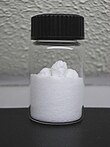
Back Natriumsulfiet Afrikaans كبريتيت الصوديوم Arabic Natrium sulfit Azerbaijani سودیوم سولفیت AZB সোডিয়াম সালফাইট Bengali/Bangla Sulfit de sodi Catalan Siřičitan sodný Czech Natriumsulfit German Θειώδες νάτριο Greek Natria sulfito Esperanto
 | |||
| |||
| Names | |||
|---|---|---|---|
| IUPAC name
Sodium sulfite
| |||
Other names
| |||
| Identifiers | |||
3D model (JSmol)
|
|||
| ChEBI | |||
| ChemSpider | |||
| ECHA InfoCard | 100.028.929 | ||
| EC Number |
| ||
| E number | E221 (preservatives) | ||
PubChem CID
|
|||
| RTECS number |
| ||
| UNII | |||
CompTox Dashboard (EPA)
|
|||
| |||
| |||
| Properties | |||
| Na2SO3 | |||
| Molar mass | 126.043 g/mol | ||
| Appearance | White solid | ||
| Odor | Odorless | ||
| Density | 2.633 g/cm3 (anhydrous) 1.561 g/cm3 (heptahydrate) | ||
| Melting point | 33.4 °C (92.1 °F; 306.5 K) (dehydration of heptahydrate) 500 °C (anhydrous) | ||
| Boiling point | Decomposes | ||
| 27.0 g/100 mL water (20 °C) | |||
| Solubility | Soluble in glycerol Insoluble in ammonia, chlorine | ||
| log P | −4 | ||
| Acidity (pKa) | ~9 (heptahydrate) | ||
Refractive index (nD)
|
1.565 | ||
| Structure | |||
| Hexagonal (anhydrous) Monoclinic (heptahydrate) | |||
| Hazards | |||
| NFPA 704 (fire diamond) | |||
| Flash point | Non-flammable | ||
| Safety data sheet (SDS) | ICSC 1200 | ||
| Related compounds | |||
Other anions
|
Sodium selenite | ||
Other cations
|
Potassium sulfite | ||
Related compounds
|
Sodium bisulfite Sodium metabisulfite Sodium sulfate | ||
Except where otherwise noted, data are given for materials in their standard state (at 25 °C [77 °F], 100 kPa).
| |||
Sodium sulfite (sodium sulphite) is the inorganic compound with the chemical formula Na2SO3. A white, water-soluble solid, it is used commercially as an antioxidant and preservative. It is also suitable for the softening of lignin in the pulping and refining processes of wood and lignocellulosic materials.[1] A heptahydrate is also known but it is less useful because of its greater susceptibility toward oxidation by air.[2]
- ^ "High Yield Pulp Production by Modified Sulfite Process" (PDF). Retrieved 2023-10-19.
- ^ Cite error: The named reference
ISwas invoked but never defined (see the help page).


